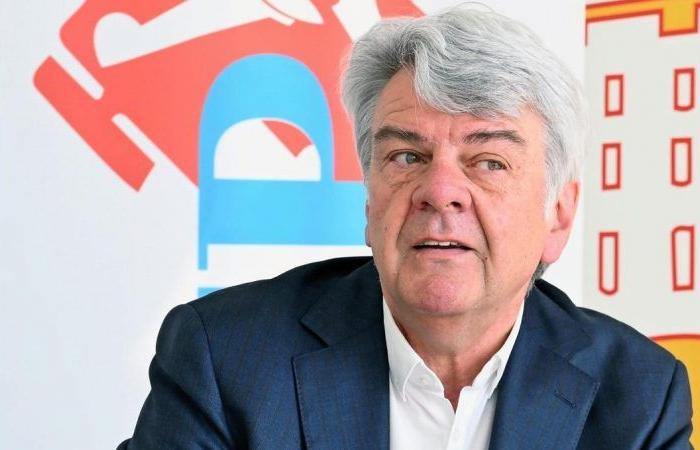Romain Wolff, the president of the CGFP, calls on the government and the employers not to sow discord in anticipation of the reform of pensions. In his eyes, tripartite would remain the “good tool” to lead a “real social dialogue”.
Big winner of the ballot aimed at renewing the chamber of civil servants and public employees (CHFEP), the general Confederation of the Public Service (CGFP) gives a pressure in the pension file. The union chaired by Romain Wolff also prepares the debate on the tax reform announced for 2026. In the very short term, the CGFP will also decide if, and to what extent, it will support the common union front formed by the OGBL and the LCGB.
Traditionally, the CGFP does not organize any festivities for the May 1. Nevertheless, what look at the two major events organized by the OGBL and the LCGB, the two major unions in the private sector?
Romain Wolff: what 1is-Mai was a little different from those of other years, with the rapprochement of the OGBL and the LCGB. I must sincerely say that I understand that the two have their strengths. The way we treat unions is essential. Here, things have been put on the table without any consultation, when it would have been better to start around a table. What was said in the speeches of the two presidents does not surprise me at all, all the more in perspective of the great national demonstration scheduled for June 28.
To what extent will the CGFP be united with the OGBL and the LCGB, both with regard to their demands and mobilization for June 28?
We will bring together our executive committee this week to discuss this question. A decision will be made at this time, but, once again, I completely understand that the two unions are reassembled against the government and castigate the way some files are processed. The OGBL and the LCGB are, of course, much more concerned by the various discord points, even if the CGFP is also very attentive to the aspect of social dialogue.
After the tensions born in the spring of 2024 around the maintenance of an evaluation system in the army, it was possible to carry out a constructive dialogue with your minister of guardianship to achieve a new salary agreement. Despite this success, do you share the fears of endangering the Luxembourg social model by the government?
We are in any case of opinion that in anticipation of the reform of pensions and the tax reform, the government would be rather advised to bring together the social partners around a table and, why not, within the framework of a tripartite. In any case, this would be the right place to discuss it, even if, at this stage, nothing concrete is still on the table.
Should we summon two tripartites, one on pensions and one on tax reform, or can we imagine a meeting dealing with these two major files?
It is perfectly possible to process the two files during the same tripartite. I remember the Covid crisis, where the government initially hesitated to bring together tripartite. The previous coalition finally understood that tripartite was the right platform to manage this crisis, and it was possible to find solutions together, between social partners, even if it was not easy. Tipartite remains the right tool to carry out a real social dialogue. It is not conceivable to get around a table to chat while the intention is to decide alone.
Regarding pensions, you criticize the Minister of Social Security, Martine Deprez, for leading a “semblance of debate”. What should we therefore remember from the large consultation process initiated last fall and closed on April 24?
We had the pleasure of attending the three round final tables, organized at the Château de Bourglinster. The table to discuss was very small, the speaking time, very limited. We were able to believe ourselves in school. Despite everything, it was interesting to hear the various opinions. It was also important that young people have their place around the table, because they will have to endure the effects of a reform. What we deplore, on the other hand, is that the minister limited herself to say hello, goodbye and thank you for the good discussions.
What does this passivity inspire in you, already castigated by other actors?
The various contributions have been gathered on a large table, and must, according to the minister, serve to define the contours of the reform. However, do not be fooled. No one can believe – we either – that the government does not yet know what it intends to do. If this is really the case, things will get more complicated.
The announcement by the Minister of a presentation of the main lines of a reform before the summer holidays is not sufficient in your eyes?
I want to repeat that the government has no mandate of the voter to carry out a reform. Neither the CSV nor the DP themized the pensions before the ballot. A party that had announced during a previous campaign wanting to act on pensions was sanctioned in the polls. Obviously, the parties have become more cautious. Once concrete proposals are on the table, we will position ourselves and, if necessary, we will take union actions. For the moment, the state of my knowledge is always the same as before the launch of the campaign « Talk to« last October.
You have denounced the fact that the intention would be to sow discord by going up the public sector against the private sector, but also the young generation against its elder. The OGBL and the LCGB join you on this position. Can you develop your thinking?
I remember that the employers attacked the public service last September, which was the first act in order to sow discord. Raising the public sector against the private sector and young people against the older ones risks questioning solidarity between generations. This is why this tactic is harmful to our society. If I look at everything that happens around us, it would be better to show cohesion. And then, we only talk about pensions, which makes the serious problems related to housing or the need to strengthen tax justice.
The question that remains to be decided is whether the pension reform will also impact the special public service regime. Do you know more in the meantime?
Since the 1999 reform, the two regimes are almost identical, with the exception of the absence of a contribution ceiling in the public service. So we are going to be impacted in one way or another. But everything in its time. We are waiting for a concrete project and we will see what will happen.
Will the CGFP join the UNI union front formed by the OGBL and the LCGB, at least with regard to pensions?
I do not exclude it. But at the same time I hope that the other two unions will not formulate claims that would be against the public service. In this case, it would be very complicated to form a common front.
The other major project is the tax reform announced for 2026. The CGFP claims from the Minister of Finance, Gilles Roth, which he implies from the start the unions in the preparations. Is this will present?
We must realize that this government intends to lead both a pensions reform and a tax reform. We will therefore be all the more attentive to the contours of the tax reform. The first ideas must soon be put on the table. In any case, we are not going to endorse degradations. A former finance minister claimed that no one would leave a reform.
We can’t wait to know if it is always the case. It will also be interesting to observe whether the political will exists to make the taxation of employees and capital more equitable. Individuals still support three -quarters of the tax burden in Luxembourg. We have the impression that this imbalance may still increase.
I fully understand that the OGBL and the LCGB are brought up against the government
Will the government have the financial room for maneuver necessary to carry out these two reforms, in addition to the need to increase the defense effort? Do you fear cuts, also to the detriment of the public service?
It should be noted that the central state deficit will finally be limited to 99 million euros for 2024. The figures were much more scary at the start. But it is not really possible to project yourself into the future. Given the geopolitical context, we cannot know what can still expect. We will therefore closely follow the evolution of the situation. However, we are aware that the money to invest in the defense will have to be found somewhere. The necessary funds must in no case come from the social budget. It is just as inconceivable as we use the reserve of 30 billion euros accumulated by the compensation fund.
The signing of the new salary agreement is not the only recent success for the CGFP. Your union came out widely winner of the social elections in the public service, by winning, with its FGFC cooperation partner, 27 of the 29 seats in the next chamber of civil servants and public employees (CHFEP).
The message given by the voter cannot be clearer. With 60 %, the participation rate is as much higher as in the election of the Chamber of Employees (Editor’s note: 34.4 %). The CGFP therefore remains more than ever the only interlocutor of the government for all questions of general interest concerning the public service.
Personally, are you targeting a third term at the head of the CHFEP?
It is too early to say. I still plan to wait a bit before giving an answer.
Always credited with two seats at the CHFEP, and firmly anchored in different entities, the OGBL continues to claim a greater place to defend the interests of the public sector. What can be the future cooperation between the CGFP and the OGBL?
I understand his wish to have more influence in the public service, but it is enough to look at the result of the elections. Before claiming a place at the negotiating table, it would be necessary to have wider support in the polls. The national representativeness of the CGFP in the public service is indisputable. We have absolute majority within the CHFEP. In the past five years, cooperation with OGBL representatives within the CHFEP has gone well, even if I also have to say that one of their two seats has been empty for almost three years …
Can this tension have a negative impact on inter-union solidarity, especially in the reform file?
If everyone plays their role, without attacking their vis-à-vis, there is no reason not to work together on files in which we can and must show unity.
Benchmarks
Marital status. Romain Wolff was born on March 14, 1961 (64 years old). He is married and father of two children.
Formation. Il and Friefen Le Larcel demon de Larnété of the Amheré, A Lippedtertive.
Professional career. Romain Wolff entered the administration of registration and domains in 1982. He will exercise his full -time functions until 2002, but will remain there until 2005. He was in particular in charge of antifraude to VAT.
CGFP and CESI. He became vice-president of the CGFP in 2002. In 2005, he took on the function of secretary general before being elected, in 2016, federal president. At the same time, Romain Wolff has been president of the European Confederation of Independent Unions (CESI) since 2012.
CHFEP. Since 2015, Romain Wolff has been president of the Chamber of Public officials and employees (CHFEP). He has been vice-president since 2010.








